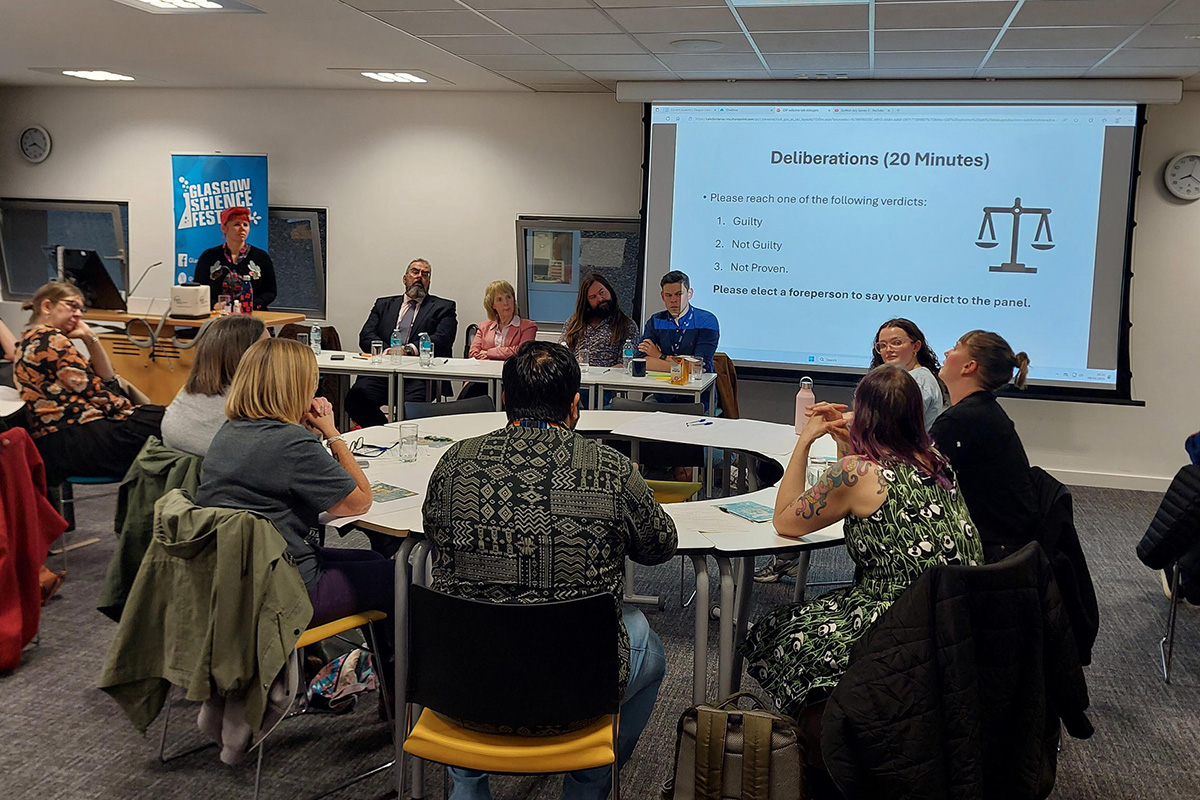
11 Jun 2025
A sell-out mock murder trial at Glasgow Caledonian University where true crime buffs were given the chance to sit on a jury and give their verdicts to an expert panel has proved a real hit.
Conviction or Acquittal: The Science of Jury Decision Making, a Glasgow Science Festival event, was hosted by Dr Lee John Curley, Lecturer in Applied Psychology at Glasgow Caledonian University, and Dr Hayley Ness, Senior Lecturer in Psychology at The Open University in Scotland.
Dr Curley said he was delighted with the turnout and feedback from the local community who attended the event on Monday night (June 9) to step into the shoes of jurors to decide whether to convict or acquit the accused.
The 70-strong audience was split into nine jury groups to watch a mock murder trial unfold and present their verdicts to an expert panel. The trial was based on a real 1909 Glasgow High Court case where a man was accused of killing his wife.
Throughout the trial, the jury groups were supported by Forensic Psychology MSc students Lucy Hoffman, Katy Rymill and Caitlin Anderson, and Counselling Psychology doctoral student Tom Sadler, a former clerk of court.
The expert panel featured Dr Curley, solicitor and OU Lecturer Gillian Mawdsley, Glasgow Caledonian Senior Lecturer in Law Dr Andrew Tickell, and leading criminal counsel Tony Lenahan KC, who discussed the verdicts, and the key themes and challenges in jury trials, before taking audience questions.
Dr Curley said: "It was a great atmosphere and we had some surprising verdicts. In the original trial the accused was found not guilty, whereas none of our jury groups returned not guilty verdicts this time. Four groups returned not proven, two found the accused guilty, and three were split.
"I think the audience struggled with the guilty or not guilty decision. They believed the individual was probably guilty but felt there were too many gaps in the evidence to convict. Usually I get more guilty verdicts, but this time I got more not proven verdicts. Interestingly, people said they preferred the not proven verdict as an acquittal option.
“It’s likely that the additional forensic evidence which was added for the mock trial to bring it into the 21st century may have swayed our jurors towards not proven or guilty verdicts. It shows that TV crime dramas such as CSI and Law and Order have put forensic science to the forefront of pop culture, making jurors think the evidence is more objective than it sometimes is.
“This was a great opportunity for me to learn more about jury decision making for future research and also for our students because, as part of their projects, they need to reflect upon jury decision making. The students were a great support to the jury groups, stimulating discussion to get a verdict at the end and talking to them about their own research.
“Jurors are normal people temporarily given great influence. It’s fascinating to see how people decide whether someone is innocent or guilty, how they process evidence and biases in decision-making, and what this means for justice.”
A number of other researchers from the Department of Biological Sciences in the School of Health and Life Sciences and the School of Computing, Engineering and Built Environment are hosting smaller events throughout the Festival.
The Department of Biological and Biomedical Sciences' team - led by Dr Jim Reilly and Dr Yvonne Dempsie' – are running Glasgow Celebrates Healthy Lives and On the March. Be Tick Aware!!! Events, Vision Sciences' lecturer Brian McGill hosts Vision Matters, Dr Kaitlin Ramsay heads up Solving Crime with Science, Dr David Hamilton is running the Musculoskeletal (MSK) team's Do I Walk Funny & Does it Matter, and Dr Juanma Parrilla will look into the Life of Matter.
The Glasgow Science Festival’s biggest-ever programme of events runs from June 5-15 with the theme ‘Glasgow Celebrates’ - https://www.gla.ac.uk/events/sciencefestival/gsf2025/